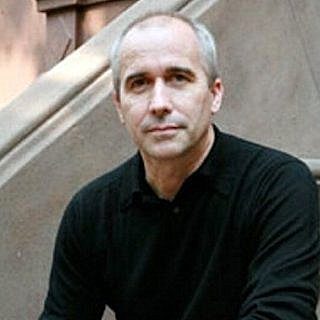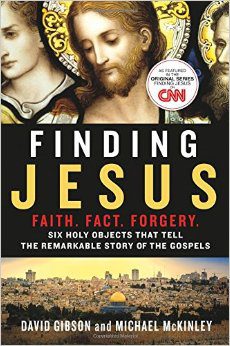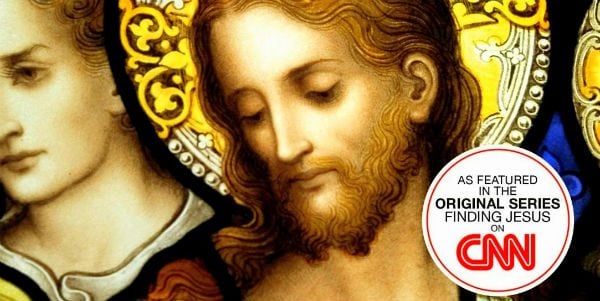While not every Christian historical artifact examined in the ongoing CNN series “Finding Jesus,” airing Sundays, is the real thing, author and Catholic convert David Gibson has no doubt about the Faith’s central figure.
Gibson co-wrote the book that inspired the series, “Finding Jesus: Faith. Fact. Forgery,” with Michael McKinley. In  conversation on Thursday, he described his mother as “a Billy Graham Evangelical,” and said, “As my mom says, ‘You can only find Jesus in the Bible.’ I say, ‘Yeah, Mom, but there are some other sources you can look at, too, to help inform you.'”
conversation on Thursday, he described his mother as “a Billy Graham Evangelical,” and said, “As my mom says, ‘You can only find Jesus in the Bible.’ I say, ‘Yeah, Mom, but there are some other sources you can look at, too, to help inform you.'”
Now the fruit of his and McKinley’s efforts have become a six-part CNN documentary series. “The Shroud of Turin” aired last week; “The Bones of John the Baptist” airs Sunday, March 8. Upcoming episodes are: “The Gospel of Judas” (March 15), “The Secret Brother of Jesus” (March 22); “The True Cross” (March 29) and “The Gospel of Mary Magdalene” (April 5, Easter Sunday).
Here’s more comments from Gibson:
On the belief by some that Jesus was neither man nor God, but merely a myth:
There’s a basic biographical gap in Jesus’ life story. The Gospels are not standard biography. Two of them have the Christmas story, the Nativity, and there’s a 30-year gap until His baptism and He starts His public ministry at the age of 30. Frankly, there’s this big gap in Jesus’ biography that wasn’t that important to His own followers, to those who knew Him and those who came after Him. The message was important. But we want to know more.
The problem is, with a gap like that, people fill the vacuum with all kinds of crazy theories, wild speculation, like “The DaVinci Code.” I wrote a story for Religion News Service a couple of months ago, there’s even a resurgence of this widely discredited theory by some non-believers, new atheists, that Jesus was a myth.
You’ve got these sensationalistic claims that there’s a new gospel coming out every other week.
On the best way to deal with questions about the historical Jesus:
Rather than discrediting and running away from the historical Jesus and the quest for the Jesus of history, we have to double down. You have to go back and look at what’s really true and what is not, ask, what do we know? I don’t think there’s any reason to be afraid of that. It can actually deepen faith.
Jesus was not a myth. I have to say, in most of our chapters, and in the TV show, when you follow the trail, and you look at all the theories, you wind up, for the most part, back at the canonical Gospels.
On Mary Magdalene:
Mary Magdalene, a chapter I wrote in the book, is always fascinating, a source of endless speculation about Jesus and celibacy and sex and marriage. The Mary Magdalene of the Gospels — and what we know of Judaism of the day — is a fascinating figure and very disruptive, shall I say, in her own right. She was called the apostle to the Apostles.
The idea that she was Jesus’ lover or Jesus’ wife is a modern opinion. Also — we go into this in the book — she wouldn’t have been called Mary of Magdala. She would have been called Mary, wife of Jesus.
She was an independent woman of means. Obviously, she and other women were supporting Jesus. Maybe she was a 60-year-old widow. Everybody thinks she’s this hot 25-year-old — well, maybe that wasn’t the case.
It’s also the idea that she, Mary Magdalene, would only be important if she was Jesus’ wife. That’s going back to this old, the vicar’s wife, kind of idea.
 On the benefits of historical research done in the light of both faith and reason:
On the benefits of historical research done in the light of both faith and reason:
There an be a fear of historical research by some believers, and this kind of thing [the book and the CNN series] is a good antidote to fundamentalism on both sides — the fundamentalist Christians who want to say, “We don’t need to use our brains and reason; we don’t need to use historical research; we know what we know, and we don’t want to hear anything else”; and fundamentalist atheists on the other side who want to say, “No, we want to use this history to undermine everything you believe.”
Well, you know what, neither works. Research and looking at the Gospels and looking at the Scripture can really only deepen one’s faith and certainly deepen the conversation, whether you believe or you don’t.
On the relics examined:
Some of them are not as claimed; some of them are probably forgeries. even; but some of them are the real deal. Some of them, all of them, open a window on history and onto the Gospels and what really happened.
Even if this piece of the True Cross isn’t the True Cross, what happened? How did these things migrate across centuries, why are they so important?
On why he’s a Catholic:
Honey, I don’t have enough time. That’s a whole other thing. I was raised Evangelical. My mom’s a Billy Graham Evangelical and very strong in her faith, but for me, I found a deeper tradition and a liturgical practice in the Catholic Church, like a number of Evangelicals have.
But again, not to diss anything else, there are so many aspects of conversion which are fascinating. Each conversion story stands on its own.
In the context of this book and this series, coming from a tradition where anything associated with relics was ridiculous or superstitious, to a tradition that reveres and venerates relics, and is also very strong on historical, Biblical research, there’s a common ground there that both sides can learn from the other on the value of looking for the Jesus of history.
Images: Covers of “Finding Jesus,” St. Martin’s Press; David Gibson, from CNN













